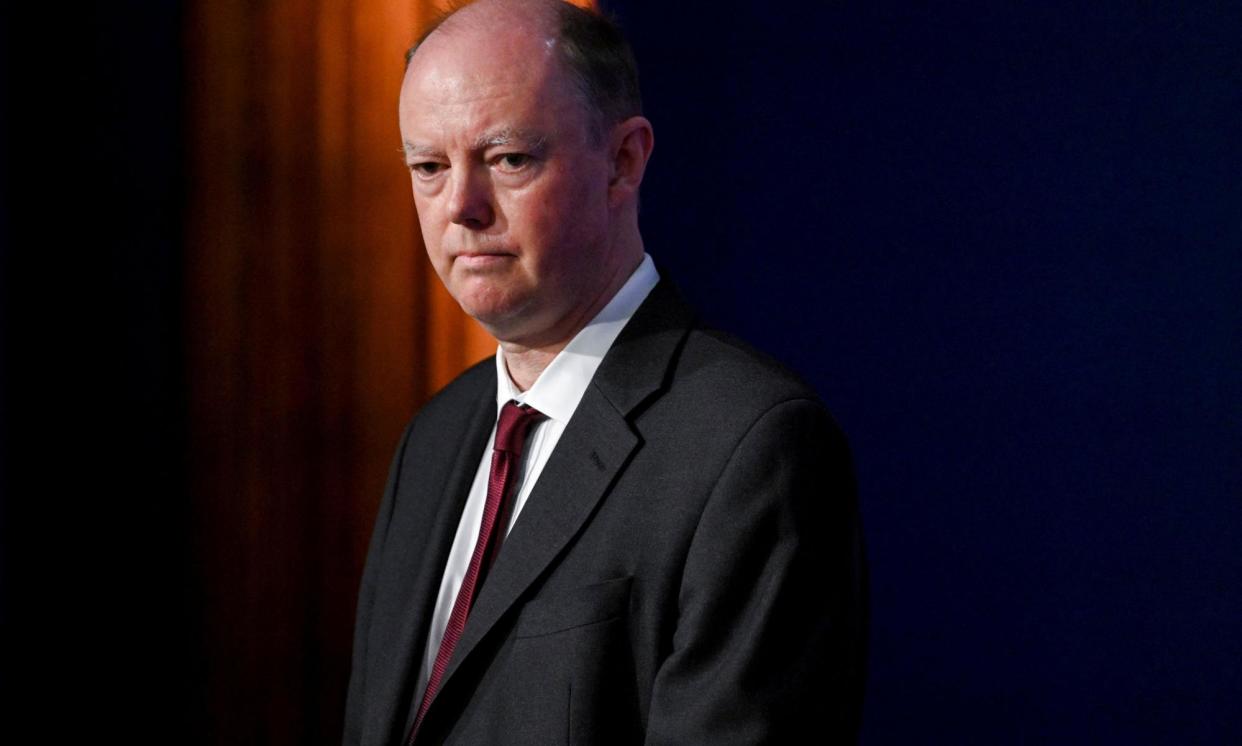Chris Whitty urges MPs to ignore lobbying and pass smoking ban bill

Chris Whitty has said lobbying by big tobacco “needs to be addressed head on”, as email evidence emerged of campaigning tactics being used to put pressure on MPs to sink Rishi Sunak’s smoking ban bill.
The landmark legislation, which would bar anyone born after 2009 from buying cigarettes, is due to be debated in parliament for the first time on Tuesday.
After the Guardian revealed that tobacco firms were lobbying politicians in an effort to block the plans, England’s chief medical officer has urged MPs to ignore unproven “talking points”, saying they come from “paid lobbyists” for “very wealthy” firms profiting from death and disease.
Highlighting the “major opportunity” MPs had to tackle health inequalities and save billions of pounds in health and economic costs, Whitty said passing the bill would have a “substantial positive effect on preventing disease, disability and death”.
The tobacco and vapes bill would prevent anyone who is turning 15 this year, or younger, from ever being able to legally buy tobacco products in England.
Although some of its positive effects would take decades to emerge, Whitty said many would be immediate, such as reducing asthma attacks in children exposed to secondhand smoke among their peers.
His intervention came after the Guardian disclosed that the tobacco industry was lobbying MPs to oppose the legislation and instead seeking support for raising the smoking age from 18 to 21 in an attempt to avoid an outright ban on buying cigarettes for the next generation.
Representatives of tobacco companies are also trying to persuade politicians to back exemptions, for example excluding cigars, from the legislation.
Writing in the Guardian, Whitty said the tobacco industry was the “one gainer from the death and disease induced by their products”, adding: “Their talking points, usually introduced by paid lobbyists, need to be addressed head on. They try to link their products to ‘choice’ despite the fact their sales are based on addiction (taking choice away).
“They always claim illegal cigarette sales will go up with new control measures, despite the evidence that they actually go down (due to reduced demand).”
Whitty accused the firms of trying to pass off new tobacco products as safe, such as with low-tar cigarettes and cigarette filters. “No tobacco products are safe,” he said.
Fresh evidence has emerged of the tactics being used to try to derail the bill. One amendment being pushed for would introduce licensing for shops selling vapes, a measure that anti-smoking campaigners say is designed to slow down the passage of legislation by burdening it with add-ons.
MPs were targeted on Friday in emails from lobbyists for British American Tobacco (BAT) – which manufactures and sells cigarettes, tobacco and other nicotine products and is the largest vape manufacturer in the UK – offering data suggesting support from constituents for such a move.
The Labour MP Alex Cunningham, who received an email telling him constituents in Stockton North wanted him to back a vaping retail licence, said the tactic was typical of big tobacco.
“What they want to do is frustrate and slow down the process,” he said. “Nobody in my constituency has contacted me about whether I should be supporting one amendment or another but it’s clear that there is strong sympathy for getting on with the job of changing the law so that future generations can be spared the damage caused by smoking.”
Deborah Arnott, the chief executive of Action on Smoking and Health (Ash), said BAT was not proposing a vaping licence for the benefit of public health.
“This is purely an attempt by the company to burden the bill with complicated extra measures which will slow down its progress,” she said. “If they can prevent the bill from being put on the statute book by the time of the general election, an incoming government will have to start all over again. It’s a well-known tobacco industry tactic called throwing ‘sand in the gears’.”
Polling is also being used to influence the debate. Forest, the self-styled “smokers’ rights” campaign group, has urged MPs to reject the bill, describing it as “ageist”.
“If you are legally an adult, it’s ageist if you are denied the same rights as adults who may be only a year or two older than you are,” said Forest’s director, Simon Clark. He cited a poll that found 64% of the public believed people should be allowed to buy cigarettes if they were allowed to drive a car, join the army, possess a credit card, buy alcohol and vote at 18.
However, Peter Kellner, a former president of YouGov and now a trustee of Ash, criticised what he said was the use of “loaded” polling questions to generate responses that would support the tobacco lobby’s campaign.
“There are all sorts of ways to elicit a response and one of them is to imply that there is some sort of cliff edge that will stop people smoking and seek a yes or no to that,” he said. “If you ask a question that makes it look like there will be a sudden change then it will tend to produce a response that is one of resistance.”
Separate polling by YouGov for Ash last year found that 75% of the public in England supported the government’s smoke-free ambitions.


